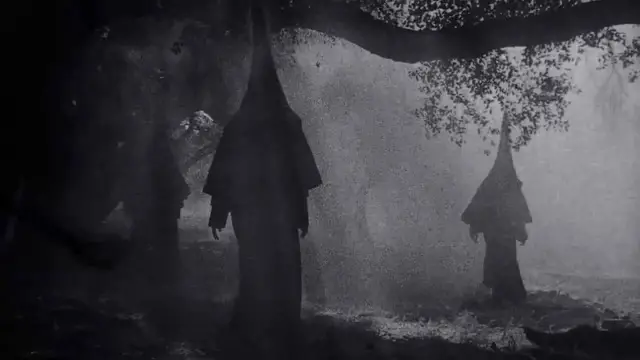
From the beginning, Black Metal has always been controversial. Its birth is in a kind of mist of uncertainty since there are, at least, three diferent opinions: one to whom Venom deserve the prize because of its 1982’s “Black Metal,” other to whom the prize must go to Bathory and their self-titled album, and finally, the ones who thinks that scandinavian bands from the 1990s deserve the credit. There is also another horde of thought for whom there are three waves of Black Metal bands which sums the aforementioned up. The price to be extreme.
But that’s not really the question. I’ve been having some kind of contact with it since 1985 when a friend, who loved it, kept on showing us everything new he’s got – of course, at that time, with some protests. He was the one who showed me for the first time bands like Venom, Slayer (that time considered speed black/thrash), Possessed, Sepultura (he had the famous split with Overdose, from which I recorded only Overdose’s), and many others. Those bands had a very healthy intent which was to be the fastest, heaviest, rawest, and loudest ever. For instance, Sarcofago stated in an interview to brazilian Metal magazine that what they were doing was a hardcore with sathanic lyrics. Pretty much it. The problem was to be raw was often confused with poor musical technique and skill. And we all agree Metal is, above all things, a musical movement. Fans and musicians demand a certain level of dexterity and competence with their instruments. At least, in a band there has to be one musician with a higher level, mostly the guitarist, or the vocalist (very frequent as well), or the drummer (who in extreme metal bands always calls the shots), or rarely, the bassist. There is another issue: to human ears high speed songs tend to be indistinguishable. Extreme bands quiclkly got aware of that. So soon, in the beginnig of the 1990s, bands started to slow down a little, while mantaining what would turn out to be their stapple: the shrieking, or guttural, vocals.
I confess I have never been a real fan of Black Metal, but since the 1990s I’ve been keeping track of the changes into extreme metal music. They kind of amused me and started to break the ice between me and BM. In 2016, however, I started to professionaly review albums and that gave me the change to have a closer view of today’s scene. It’s based on all the reviews I wrote in two years that I can easyly state Black Metal plays the role of the avant-garde of Heavy Metal.
Why the avant-guarde?
Playing an important role in the so-called extreme music, BM has called the shots for extreme positions as well. From the beginning, it has positioned itself as an anti-christianism and anti-religion force, but many bands have abandoned the early satanism they’ve been into. In general, Black Metal now stands for pagan/pre-christian ancient rites, mostly of european background.
With Napalm Death’s “Scum” calling off the-search-for-the-speed-of-light in music in 1988, no one could go further. As simple as that. Thus, bands, after this seminal effort, were kind of obliged to vary not only in tempo, but also in cadence. To get slower also meant the search for more complex musical structures to cope with the new intent in order to recreate a chaotic atmosphere without making their music unpalatable. As a result, bands started to add some dissonances and unconventional melodic and harmonic structures taken from classical music. Doing so, black metal wiped every single blues tradition off in Metal songwriting, and also jazzy inspirations. To cause even more estrangement – actually one of the main ideias left – bands jumped into bringing unusual ancient musical instruments. There are now only two untouched references in BM: shrieking vocals and the need for transgression. But even vocals are kind of different now, all kinds of voices were added searching for all kinds of disturbing results as witches’ squeaks, growls, yells, and even almost angelical voices taken from classical singing references in order to come up with more weird, or devilish beautiful textures. Heaven – or hell – is the limit for experiment.
Unfortunately to guitar solo lovers, as I am, most new efforts are showing very few guitar solos, or even none. You can hear albums and albums and not hear any guitar solo at all. One more time the intent is to skip conventional sonance.
Riffing has also changed a bit. They got even more mesmerized and repetitive. Bands also tried to recreate a sick version to art rock as long as it is one more reference to new BM bands, but the intent is to use keyboards for more complex, and twisted, harmonic structures to sound distaste and some kind of aversion. Every sonance is possible: from beautiful piano passages to childish keyboard sounding; from etheral keyboarding to 1980s technopopish. Discomfort is again the ideia, but such a slight – or not – way not to make listener give up.
To me the most important feature is that BM music got closer to a perfect representation of life due to exploring the most varied human emotions: angry, pain, anguish, fear, rage, rebellion, despair, frustration, and many others sometimes in only one song. Those emotions are kind of prohibited in modern pop music. Not only in music, our society has its difficulties in dealing with them. BM does not. BM is a blatant – and uncensored – demonstration of human – black – spirit. There is none of that plastic happiness and joy imposed to each human being by the so-called cultural industry which has been assaulting us with a, to say the least, tasteless and senseless music.
BM is a mundane representation of reality.